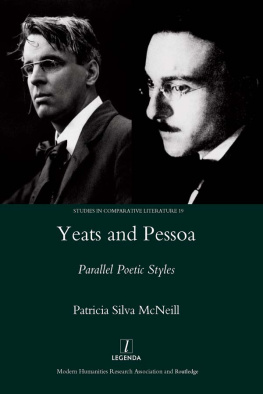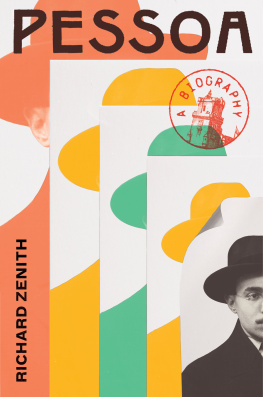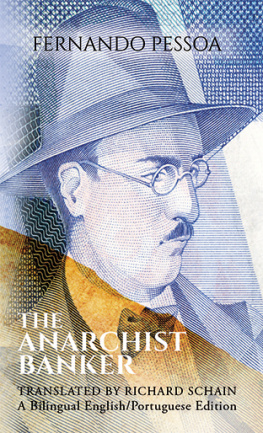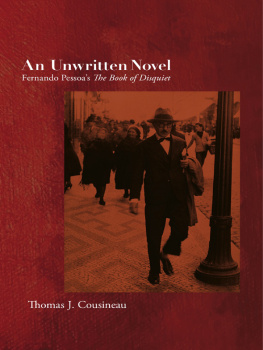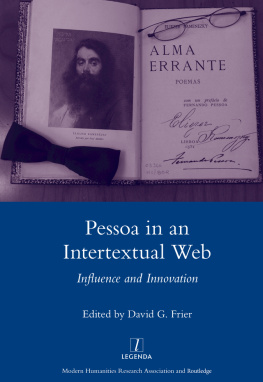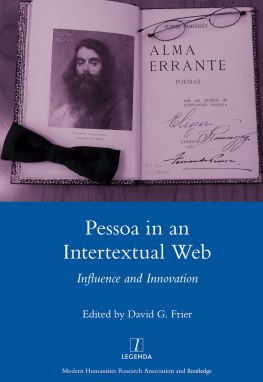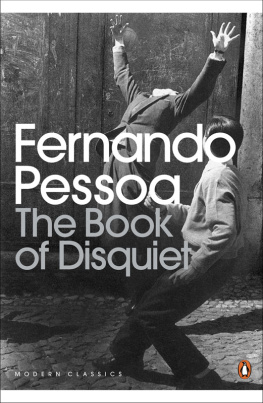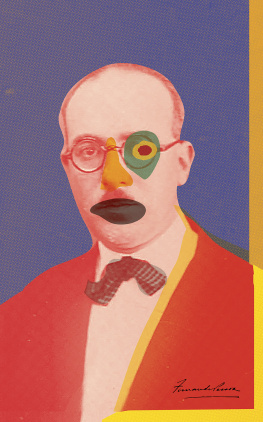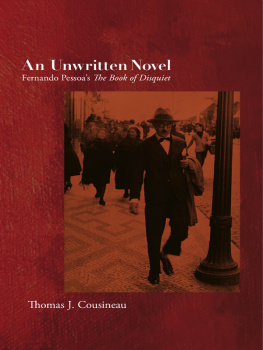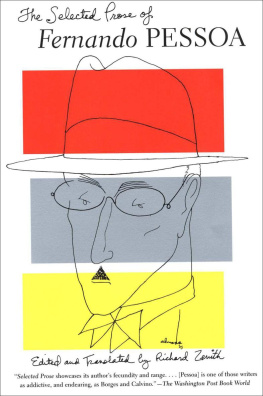PENGUIN BOOKS
The Book of Disquiet
A Modernist touchstone no one has explored alternative selves with Pessoas mixture of determination and abandon In a time which celebrates fame, success, stupidity, convenience and noise, here is the perfect antidote, a hymn of praise to obscurity, failure, intelligence, difficulty and silence John Lanchester, Daily Telegraph
His prose masterpiece Richard Zenith has done an heroic job in producing the best English-language version we are likely to see for a long time, if ever Nicholas Lezard, Guardian
The Book of Disquiet was left in a trunk which might never have been opened. The gods must be thanked that it was. I love this strange work of fiction and I love the inventive, hard-drinking, modest man who wrote it in obscurity Paul Bailey, Independent
Fascinating, even gripping stuff a strangely addictive pleasure Kevin Jackson, Sunday Times
Must rank as the supreme assault on authorship in modern European literature readers of Zeniths edition will find it supersedes all others in its delicacy of style, rigorous scholarship and sympathy for Pessoas fractured sensibility the self-revelation of a disoriented and half-disintegrated soul that is all the more compelling because the author himself is an invention Long before postmodernism became an academic industry, Pessoa lived deconstruction John Gray, New Statesman
Portugals greatest modern poet deals with the only important question in the world, not less important because it is unanswerable: What am I? Anthony Burgess, Observer
Pessoas rapid prose, snatched in flight and restlessly suggestive, remains haunting, often startling, like the touch of a vibrating wire, elusive and persistent like the poetry there is nobody like him W. S. Merwin, New York Review of Books
ABOUT THE AUTHOR
Fernanco Pessoa was born in Lisbon in 1888 and was brought up in Durban, South Africa. In 1905 he returned to Lisbon to enrol at the university, but soon dropped out, preferring to study on his own. He made a modest living translating the foreign correspondence of various commercial firms, and wrote obsessively in English, Portuguese and French. He self-published several chapbooks of his English poems in 1918 and 1922, and regularly contributed his Portuguese poems to literary journals such as Orpheu and Portugal Futurista. Mensagem, a collection of poems on patriotic themes, won a consolation prize in a national competition in 1934. Pessoa wrote much of his greatest poetry under three main heteronyms, Alberto Caeiro, Alvaro de Campos and Ricardo Reis, whose fully fleshed biographies he invented, giving them different writing styles and points of view. He created dozens of other writerly personas, including the assistant bookkeeper Bernardo Soares, fictional author of The Book of Disquiet. Although Pessoa was acknowledged as an intellectual and a poet, his literary genius went largely unrecognized until after his death in 1935.
Richard Zenith lives in Lisbon, where he works as a freelance writer, translator and critic. His translations include GalicianPortuguese troubadour poetry, novels by Antnio Lobo Antunes and Fernando Pessoa and Co. Selected Poems, which won the 1999 American PEN Award for Poetry in Translation.
FERNANDO PESSOA
The Book of Disquiet
Edited and translated by Richard Zenith

PENGUIN BOOKS
PENGUIN BOOKS
Published by the Penguin Group
Penguin Books Ltd, 80 Strand, London WC2R 0RL, England
Penguin Putnam Inc., 375 Hudson Street, New York, New York 10014, USA
Penguin Books Australia Ltd, 250 Camberwell Road, Camberwell, Victoria 3124, Australia
Penguin Books Canada Ltd, 10 Alcorn Avenue, Toronto, Ontario, Canada M4V 3B2
Penguin Books India (P) Ltd, 11, Community Centre, Panchsheel Park, New Delhi 110 017, India
Penguin Books (NZ) Ltd, Cnr Rosedale and Airborne Roads, Albany, Auckland, New Zealand
Penguin Books (South Africa) (Pty) Ltd, 24 Sturdee Avenue, Rosebank 2196, South Africa
Penguin Books Ltd, Registered Offices: 80 Strand, London WC2R 0RL, England
www.penguin.com
First published in Portuguese as Livro do Desassossego by Assrio & Alvim 1998
This translation first published in Great Britain by Allen Lane The Penguin Press 2001
Published in Penguin Classics 2002
1
Original text copyright Assrio & Alvim and Fernando Pessoas heirs, 1998
Editorial matter, selection and translation copyright Richard Zenith, 2001
All rights reserved.
The moral right of the translator has been asserted
Except in the United States of America, this book is sold subject
to the condition that it shall not, by way of trade or otherwise, be lent,
re-sold, hired out, or otherwise circulated without the publishers
prior consent in any form of binding or cover other than that in
which it is published and without a similar condition including this
condition being imposed on the subsequent purchaser
Contents
Introduction
Im astounded whenever I finish something. Astounded and distressed. My perfectionist instinct should inhibit me from finishing; it should inhibit me from even beginning. But I get distracted and start doing something. What I achieve is not the product of an act of my will but of my wills surrender. I begin because I dont have the strength to think; I finish because I dont have the courage to quit. This book is my cowardice. (Text 152)
Fernando Antnio Nogueira Pessoa was born in Lisbon in 1888, died there in 1935, and did not often leave the city as an adult, but he spent nine of his childhood years in the British-governed town of Durban, South Africa, where his stepfather was the Portuguese consul. Pessoa, who was five years old when his natural father died of tuberculosis, developed into a shy and highly imaginative boy, and a brilliant student. Shortly after his seventeenth birthday, he returned to Lisbon to enrol in the university but soon dropped out, preferring to study on his own at the National Library, where he systematically read major works of philosophy, history, sociology and literature (especially Portuguese) in order to complement and extend the traditional English education he had received in South Africa. His production of poetry and prose in English during this period was intense, and by 1910 he was also writing extensively in Portuguese. He published his first essay in literary criticism in 1912, his first piece of creative prose (a passage from The Book of Disquiet) in 1913, and his first poems in 1914.
Living sometimes with relatives, sometimes in rented rooms, Pessoa supported himself by doing occasional translations and by drafting letters in English and French for Portuguese firms that did business abroad. Although solitary by nature, with a limited social life and almost no love life, he was an active leader of Portugals Modernist movement in the 1910s, and he invented several of his own movements, including a Cubist-inspired Intersectionism and a strident, quasi-Futurist Sensationism. Pessoa stood outside the limelight, however, exerting influence through his writings and in his conversations with more conspicuous literary figures. Respected in Lisbon as an intellectual and a poet, he regularly published his work in magazines, several of which he helped to found and run, but his literary genius went largely unrecognized until after his death. Pessoa was convinced of his own genius, however, and he lived for the sake of his writing. Although he was in no hurry to publish, he had grandiose plans for Portuguese and English editions of his complete works, and he seems to have held on to most of what he wrote.
Next page

